-
PROVIDERS
Register now
Are you getting the full picture? A webinar series on the power of comprehensive intelligent diagnostics
-
LIFE SCIENCES
Enroll now
Tempus’ Patient-Derived Organoid ScreensEvaluate the efficacy of your preclinical compounds using fixed organoid panels designed for diverse therapeutic applications. Space is limited — enroll by June 30, 2025, to secure your spot.
-
PATIENTS
It's About Time
View the Tempus vision.
- RESOURCES
-
ABOUT US
View Job Postings
We’re looking for people who can change the world.
- INVESTORS
Solutions for Undertreated Patients
AI-enabled care pathway platform to help clinicians find patients with undertreated cardiovascular disease.
Tempus Next Cardiology is a care pathway intelligence platform that empowers providers to deliver the next step in a patient’s care journey.
Tempus Next uses AI to support clinicians in closing care gaps by identifying patients who have not received treatment consistent with applicable guidelines and delivering customized and accurate notifications directly within an established clinical workflow.
Identify and contextualize patients in their care journey
AI-enabled solutions surface deep insights from multimodal, longitudinal patient data including medical imaging, EHR data, clinician notes and time series data.
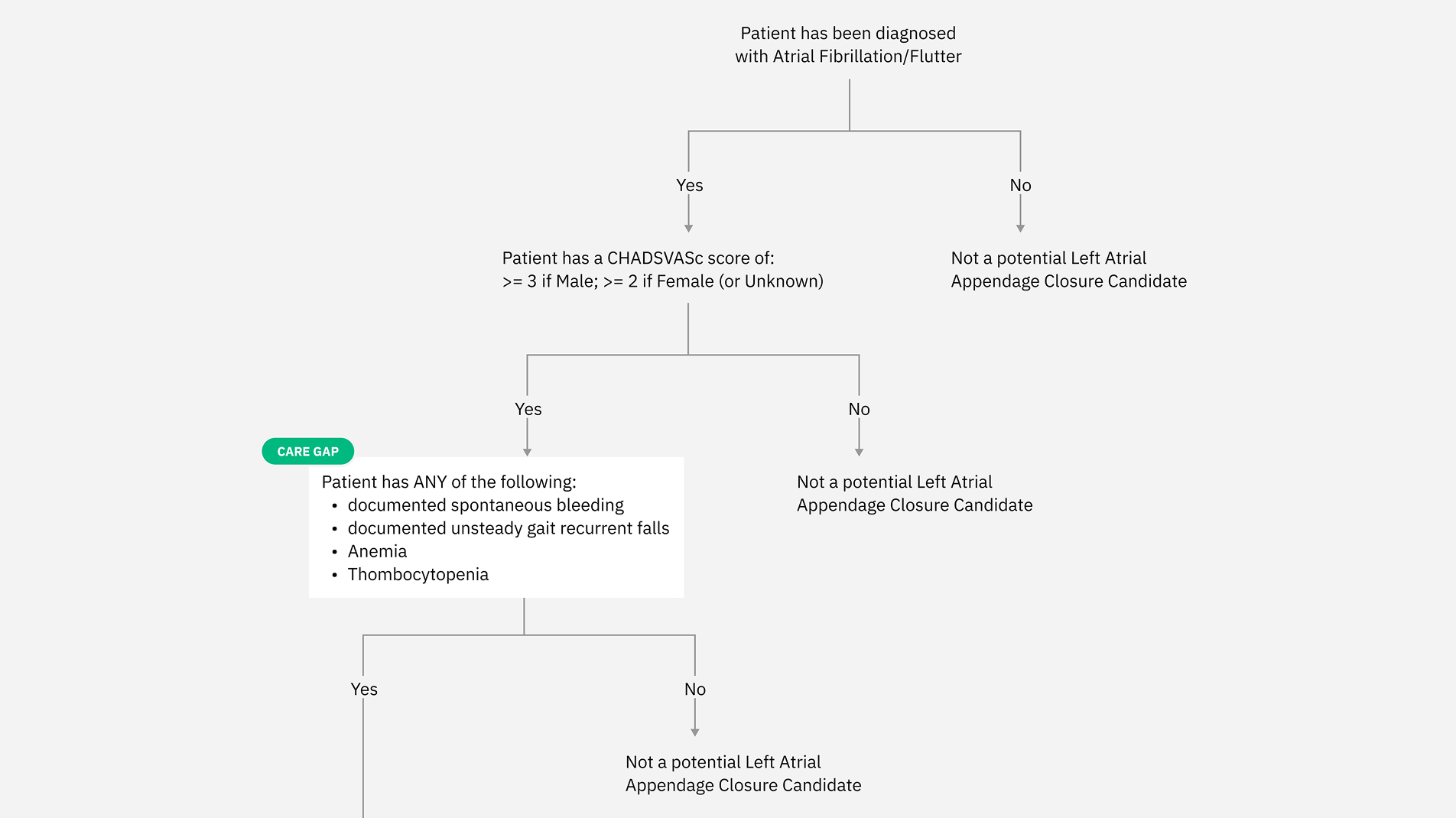
Surface precision care pathways at the point of care
Tiered and customized notifications consistent with precision medicine guidelines in the clinicians’s workflow reduce alert fatigue.
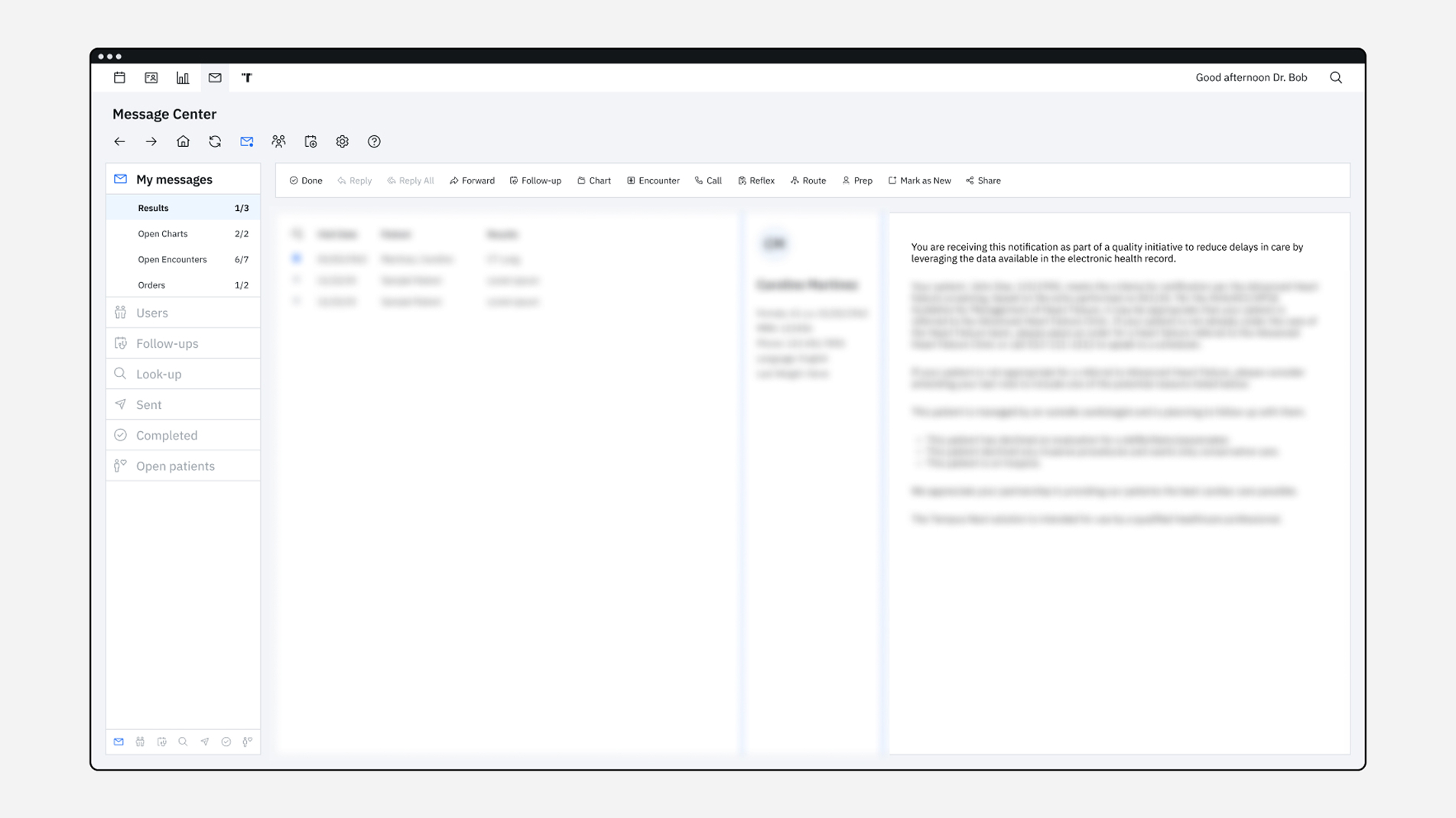
Track patients for timely follow-up to help improve outcomes
Manage current patient care effectively with Patient Tracking, search for specific patient groups using Patient Lists, and gain insights into your hospital’s patient population with our dashboards.
Increase equitable access to care
Helping clinicians with timely and accurate diagnostics, procedures, and therapies for all patients, regardless of socioeconomic status.
Figure: In this study, black patients saw a larger decrease in average time from index echo to follow-up (120 to 64 days) compared to white patients (57 to 36 days). This shows the improvement in black patients’ time to follow-up towards the average of all patients (narrowing the gap).
Horde G, Sotelo M, D’Amico A, et al. Use of an echocardiographic-based, artificial intelligence system to improve racial disparities in care of patients with valvular heart disease. European Heart Journal – Cardiovascular Imaging. 2023;24(Suppl 1):38.3.
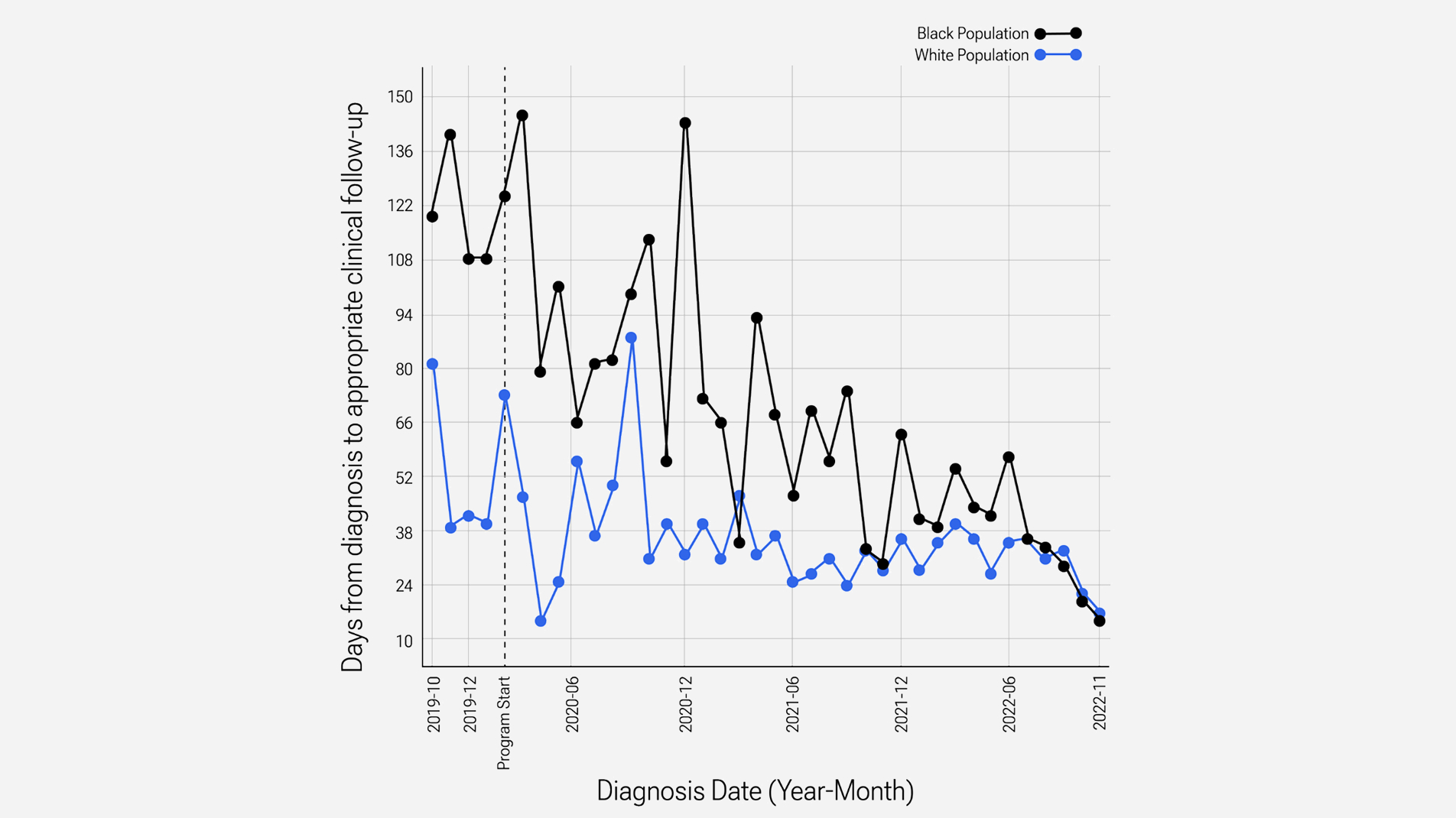
Disease areas
-
AORTA
Tempus Next includes screening algorithms for abdominal aortic aneurysms (AAA) and thoracic aortic aneurysms (TAA) using clinician reports from abdominal ultrasounds and CTs, in addition to all other available patient data.
Our system provides guidelines driven notifications and follows patients through progression from low severity to high severity.
-
Structural heart
Tempus Next Structural Heart capabilities include screening for appropriate care across aortic stenosis, aortic regurgitation, mitral stenosis, mitral regurgitation, tricuspid regurgitation, and pulmonary regurgitation.
Tempus Next delivers guidelines driven notifications to help providers close care gaps in these populations.
-
Cardiomyopathies
Within cardiomyopathies, Tempus Next screening protocols address care across non-ischemic dilated cardiomyopathy and cardiac oncologic disease.
Our mission is to shorten the time to referral for consideration of advanced heart failure treatment options like left ventricular assist devices or heart transplants.
We also aim to enable clinicians to track patient adherence to prescribed diagnostic studies and follow-up visits with cardiologists based on guidelines.
-
Electrophysiology
Tempus Next electrophysiology capabilities include screening for risk of sudden cardiac arrest (SCA), risk of left atrial appendage thrombus, and atrial fibrillation.
SCA causes over 300,000 deaths annually in the United States; however, prevention is challenging due to difficulty identifying at-risk patients.1
Less than 10% of patients who meet the AHA/ACC/HRS guidelines criteria for a primary prevention implantable cardioverter-defibrillator (ICD) receive a device, with women more likely to be undertreated.2
Tempus Next continuously monitors patient data to find at-risk patients, and alerts the patient’s care team of any guidelines based follow-up or disease progression.
-
Guideline Directed Medical Therapies
Tempus Next screens for an array of additional conditions including congestive heart failure and ischemic heart diseases.
Our program monitors length of time and patient adherence to Guideline Directed Medical Therapy, as well as key markers including ejection fraction during this period to determine the potential need for referral to a heart clinic based on guidelines.
Studies have shown that patients not optimized on Guideline Directed Medical Therapy are 26% more likely to have higher annualized healthcare utilization and emergency department visits.3
Tempus Next includes screening algorithms for abdominal aortic aneurysms (AAA) and thoracic aortic aneurysms (TAA) using clinician reports from abdominal ultrasounds and CTs, in addition to all other available patient data.
Our system provides guidelines driven notifications and follows patients through progression from low severity to high severity.
Tempus Next Structural Heart capabilities include screening for appropriate care across aortic stenosis, aortic regurgitation, mitral stenosis, mitral regurgitation, tricuspid regurgitation, and pulmonary regurgitation.
Tempus Next delivers guidelines driven notifications to help providers close care gaps in these populations.
Within cardiomyopathies, Tempus Next screening protocols address care across non-ischemic dilated cardiomyopathy and cardiac oncologic disease.
Our mission is to shorten the time to referral for consideration of advanced heart failure treatment options like left ventricular assist devices or heart transplants.
We also aim to enable clinicians to track patient adherence to prescribed diagnostic studies and follow-up visits with cardiologists based on guidelines.
Tempus Next electrophysiology capabilities include screening for risk of sudden cardiac arrest (SCA), risk of left atrial appendage thrombus, and atrial fibrillation.
SCA causes over 300,000 deaths annually in the United States; however, prevention is challenging due to difficulty identifying at-risk patients.1
Less than 10% of patients who meet the AHA/ACC/HRS guidelines criteria for a primary prevention implantable cardioverter-defibrillator (ICD) receive a device, with women more likely to be undertreated.2
Tempus Next continuously monitors patient data to find at-risk patients, and alerts the patient’s care team of any guidelines based follow-up or disease progression.
Tempus Next screens for an array of additional conditions including congestive heart failure and ischemic heart diseases.
Our program monitors length of time and patient adherence to Guideline Directed Medical Therapy, as well as key markers including ejection fraction during this period to determine the potential need for referral to a heart clinic based on guidelines.
Studies have shown that patients not optimized on Guideline Directed Medical Therapy are 26% more likely to have higher annualized healthcare utilization and emergency department visits.3
- Sudden Cardiac Arrest Foundation. January 29, 2020. Latest statistics: 1,000 people suffer sudden cardiac arrest each day in U.S.; only 10% survive [online]. Available from: https://www.sca-aware.org/sca-news/latest-statistics-1000-people-suffer-sudden-cardiac-arrest-each-day-in-us-only-10-survive [Accessed May 1, 2023]
- Husband G.; D”amico A.; Hasnie U.; Batra N.; Cochrun S.; Gann A.; Li E.; Nguyen D.; Philip George A.; Soto M.; Rogers C.; Ahmed M.; Andrikopoulou E.; UAB Hospital, Birmingham, United States of America; University of South Alabama, Mobile, United States of America; The Johns Hopkins Hospital, Baltimore, United States of America. February 2022. European Heart Journal – Cardiovascular Imaging, Volume 23, Issue Supplement_1 [online]. Available from: https://academic.oup.com/ehjcimaging/article/23/Supplement_1/jeab289.244/6522478
- J Comp Eff Res. October 2021. Healthcare utilization and guideline-directed medical therapy in heart failure patients with reduced ejection fraction [online]. Available from: https://pubmed.ncbi.nlm.nih.gov/34225473/ [Accessed May 1, 2023]
Our Impact
-
60+
algorithms to identify potential care gaps across 15 cardiovascular diseases
-
~2M
patients screened
-
50K+
patients screened per month
-
100+
hospitals nationwide are currently powered by Tempus Next
-
350+
EHR connected health systems across 2,000+ hospitals

Case Study
Identifying patients with valvular heart disease: A partnership between St. Francis and TempusLearn how the deployment of Tempus Next, an AI-enabled clinical care pathway solution, at a specialty designated cardiac and heart valve center helped enable guideline directed care for patients with structural heart disease.
LEARN MORE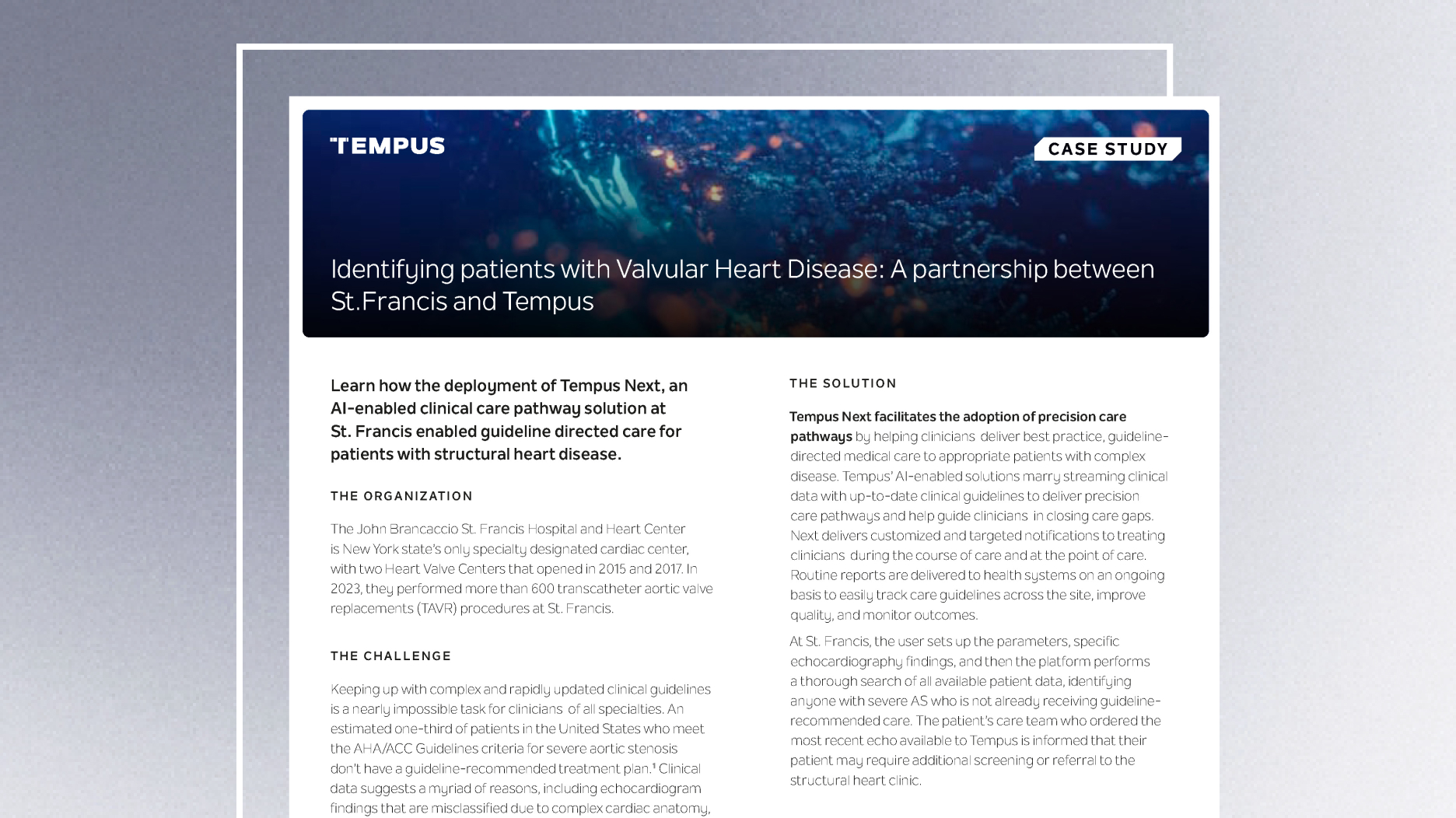
Case Study
Revolutionizing Cardiac Care: AI-Driven Detection and Treatment of Critical Heart Valve Disease at Boulder Community HealthDiscover how Tempus Next’s AI-powered care pathway platform transformed patient outcomes by helping ensure timely, guideline-directed treatment for critical heart valve disease at Boulder Community Health.
LEARN MORE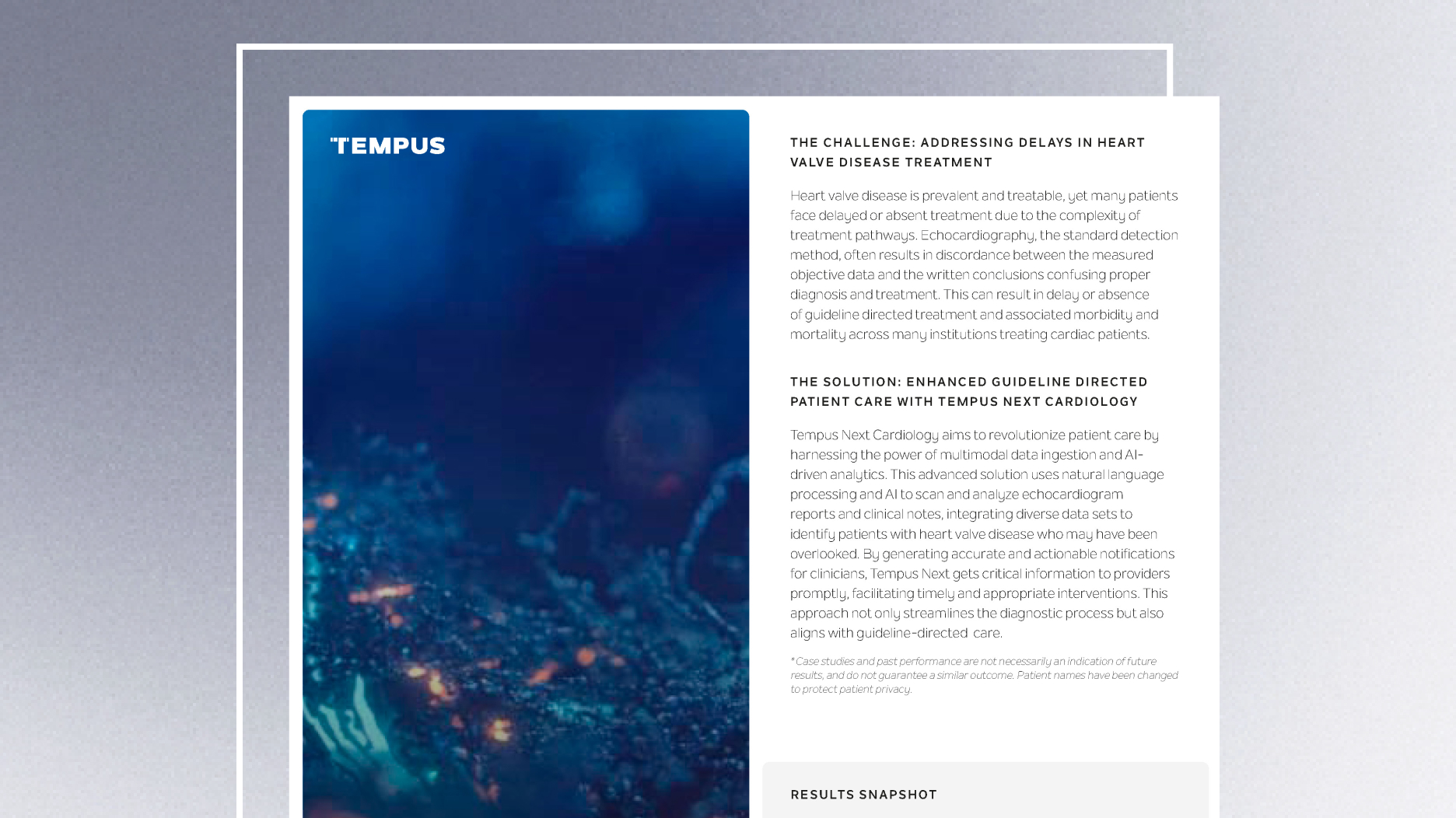
Case Study
The Cardiac Wire Show: Addressing Gaps in Heart Valve CareDiscover how AI is transforming heart valve care in the latest Cardiac Wire show featuring Logan Brigman of Tempus AI and Daniel O’Hair, MD of Boulder Community Health.
watch now
Case Study
Addressing Health Disparities at a Large Academic Medical Center: AI-Driven Cardiac Care for Aortic Stenosis and Mitral RegurgitationDiscover how Tempus Next leverages AI to address racial disparities in cardiac care, significantly improving follow-up times for patients with severe Aortic Stenosis and severe Mitral Regurgitation.
LEARN MORE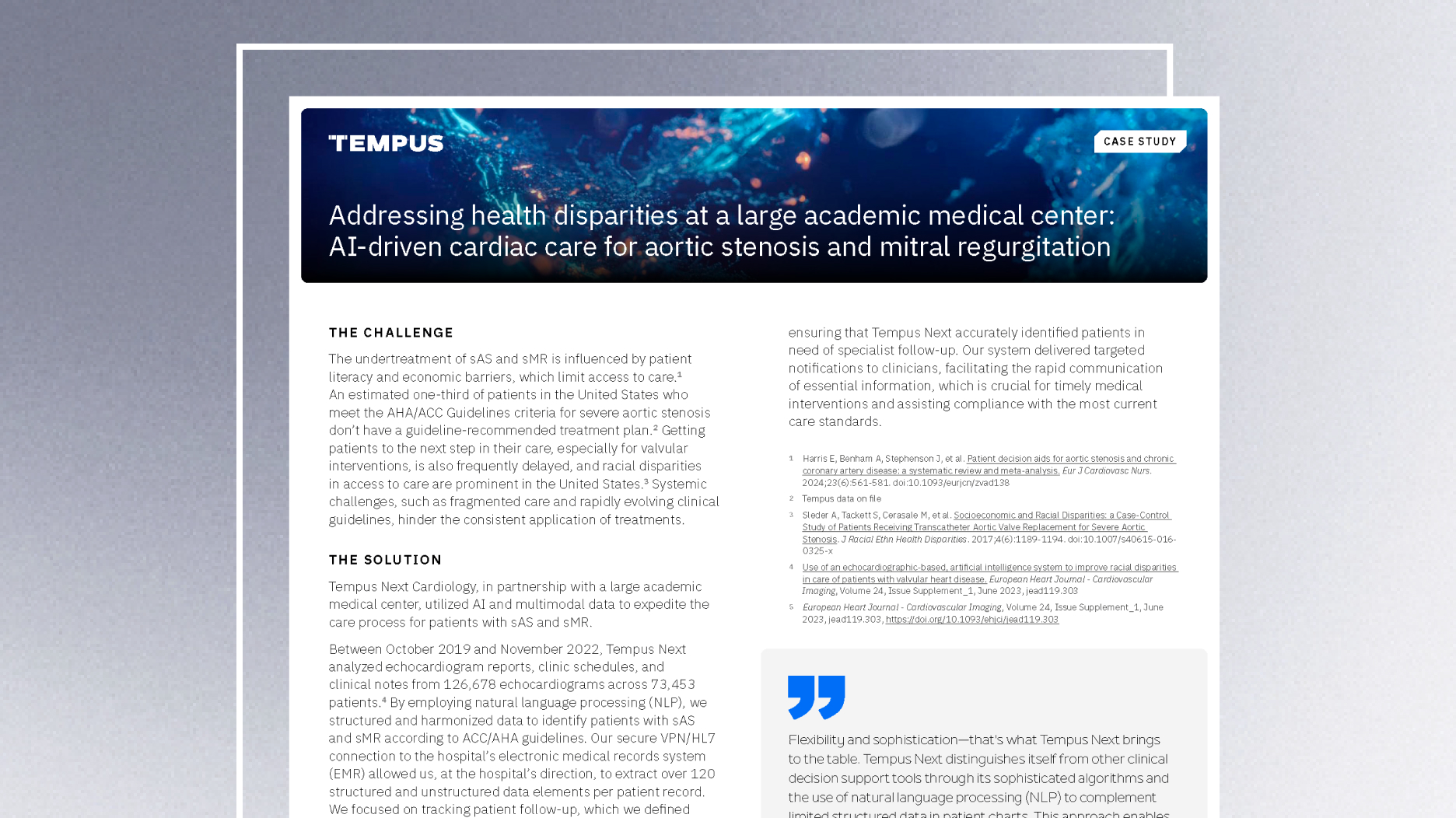
-
UPCOMING WEBINAR:
A Novel Phenotyping Pipeline to Improve Identification of Patients with Pulmonary Hypertension in Electronic Health Records
05/22/2024
Read more -
UPCOMING WEBINAR:
Structured EHR Data Underestimates Prevalence and Misses Large Proportions of Patients with Pulmonary Hypertension
05/22/2024
Read more -
UPCOMING WEBINAR:
Predictors of Disease Progression and Adverse Clinical Outcomes in Patients With Moderate Aortic Stenosis Using an Artificial Intelligence-Based Software Platform
05/04/2024
Read more -
UPCOMING WEBINAR:
Large Language Models with Retrieval-Augmented Generation for Zero-Shot Disease Phenotyping
12/11/2023
Read more -
UPCOMING WEBINAR:
Racial and Echocardiographic predictors of all-cause mortality in patients with moderate Tricuspid Regurgitation: a single center study
Journal of the American College of Cardiology, 03/2022
Read more -
UPCOMING WEBINAR:
Machine learning analysis including social determinants of health for prediction of mortality following Transcatheter Aortic Valve Implantation: a single center experience
European Heart Journal - Cardiovascular Imaging, 02/24/2022
Read more -
UPCOMING WEBINAR:
Machine learning analysis of progression from moderate to severe Tricuspid Regurgitation
AHA Scientific Section, 11/08/2021
Read more -
UPCOMING WEBINAR:
Enhanced detection of Heart Valve Disease using integrated artificial intelligence at scale
06/14/2021
Read more
Partnering with Tempus is investing in the future
We believe that AI-enabled solutions can help shorten the diagnostic odyssey and improve the lives and outcomes of patients with cardiovascular disease.